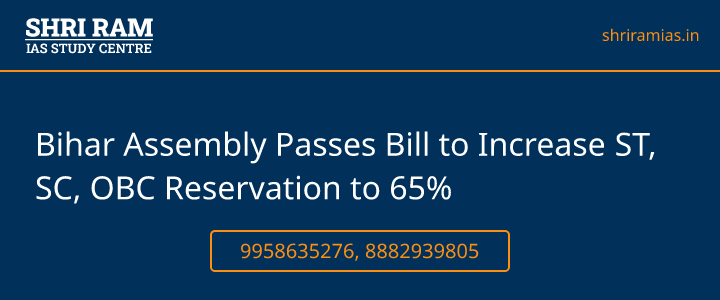
In a historic move aimed at promoting social inclusion, the Bihar Assembly recently passed a landmark bill to increase the reservation for Scheduled Tribes (ST), Scheduled Castes (SC), and Other Backward Classes (OBC) in the state to 65%. This progressive step has the potential to break barriers and empower marginalized communities. In this blog post, we will delve into the significance of this decision, its implications for social justice, and the long-term impact it can have on the welfare of underprivileged sections of society.
Understanding the Reservation Policy
Reservation in India is a constitutional provision aimed at rectifying historical injustices faced by certain communities and ensuring their representation in educational institutions and government jobs. The policy seeks to level the playing field by reserving a specific percentage of seats for socially and economically disadvantaged groups. The Bihar Assembly's decision to increase reservation demonstrates a commitment to addressing the deep-rooted inequalities prevalent in society.
The Need for Increased Reservation
The decision to raise the reservation quota in Bihar to 65% comes as a response to the pressing need for social upliftment and inclusivity. Historically marginalized communities, including ST, SC, and OBC groups, have faced systemic discrimination and limited access to resources, education, and opportunities. By increasing reservation, the government aims to bridge the gap and provide a more equitable platform for these communities to thrive.
Ensuring Equal Representation
By amplifying the reservation quota, the Bihar Assembly is taking a crucial step towards ensuring fair representation for underprivileged communities in educational institutions and government jobs. This move not only enables marginalized groups to have a voice in decision-making processes, but it also contributes to a more diverse and inclusive society.
Promoting Educational Opportunities
Education acts as a catalyst for social transformation and upward mobility. By increasing reservation, the Bihar government seeks to provide better access to quality education for ST, SC, and OBC communities, who have historically faced limited opportunities. This move can help break the cycle of poverty and contribute to the socio-economic development of these communities.
Empowering Marginalized Communities
Increased reservation is a powerful tool for empowerment. By providing adequate representation, the government is acknowledging the agency and potential of marginalized communities. It sends a strong message that everyone, regardless of their social background, deserves equal opportunities to excel and contribute to the progress of society.
Addressing Caste-Based Discrimination
Caste-based discrimination has persisted in Indian society for centuries. The enhanced reservation quota in Bihar represents a progressive effort to combat this discrimination by creating a more inclusive and egalitarian society. This step challenges social prejudices and aims to dismantle the walls of inequality that have limited the progress of certain communities.
Enhancing Social Justice
The decision to increase reservation serves as an instrument of social justice. It reaffirms the commitment of the Bihar government to create a society where every individual has equal access to education, employment, and opportunities for growth. This move has the potential to uplift marginalized communities and break down the barriers that have hindered their progress.
Impact on Policy Implementation and Governance
With the increased representation of disadvantaged communities through the reservation, policy formation and governance are likely to become more inclusive and sensitive. The perspectives and experiences of marginalized communities will be integrated into decision-making processes, leading to policies that better address their needs and aspirations.
Challenges and Way Forward
While the increased reservation quota in Bihar is undoubtedly a positive step, it is essential to address a few challenges in its implementation. Ensuring the availability of quality education, infrastructure, and training opportunities for students from underprivileged backgrounds will be crucial. Additionally, promoting social harmony and eradicating caste-based prejudices through awareness campaigns and inclusive initiatives will help build a truly equitable society.
Conclusion
The Bihar Assembly's decision to increase reservation for ST, SC, and OBC communities to 65% marks a remarkable leap towards social inclusivity and empowerment. This progressive move has the potential to transform the lives of millions of individuals who have long been denied equal opportunities. It signifies the government's commitment to fostering a more just and inclusive society. By providing better access to education and employment, this decision can turn the tide for marginalized communities in Bihar and set a precedent for other states to follow. Ultimately, the increased reservation quota paves the way for a brighter future, where every citizen can realize their full potential and contribute to the nation's growth. This bill is relevant for UPSC 2024 aspirant for IAS exam.
